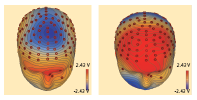Innovation
Context
TCIN, through the excellence and relevance of its research, has engaged in major collaborations with industry partners (such as GlaxoSmithKline, Intel, and GE). Its innovation goals are accomplished through growing existing partnerships and forging new ones with industrial collaborators. The GSK-TCIN collaborative programme has, for example, focused on translational research to accelerate the development of novel therapies for Alzheimer’s disease. The Intel-GE-TCIN collaborative programme has focused on the development of technologies to support independent living in old age. These are very substantial programmes involving multiple TCIN Principal Investigators (including clinician-scientists), and provide advanced training and experience for a large cadre of postdoctoral researchers and Ph.D. students. TCIN intends to continue to strengthen such links, and to use our extensive experience with commercial entities to engage in further large-scale, fundamental problem-oriented research. TCIN is very attractive as a collaborator, because the breadth and depth of our focus on translational research enables the acceleration of the development of novel therapies for neurocognitive function.
Scientific and Societal Impact
TCIN has a collaborative research capacity among its Principal Investigators which uniquely integrates cognition, behaviour, neurophysiology, biomarkers and imaging in preclinical and clinical models of neurocognitive function in health and disease. TCIN’s creation of new knowledge has contributed significantly to Ireland’s smart economy, through the conduct of research that is pivotal to the development of new pharmaceutical and other therapies for brain diseases, and also through the education and training of Ph.D. students and post-doctoral researchers suited to a knowledge-led society. Such human capital formation is a significant contribution towards national and global economic recovery.
Strategic Innovation Objectives
- Develop and promote research interest groups that harness our collective strengths eg. Children’s Brain Health Research
- Establish targets for the commercialisation of soft research services, e.g. to establish a focused contract research service over the next five years.
- Play an active part in the Innovation Academy to develop the skills of Ph.D. researchers in neuroscience.
- Develop at least one spin-out company based on current research discoveries within TCIN over the next five years.



